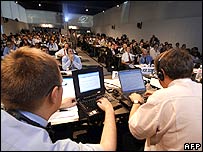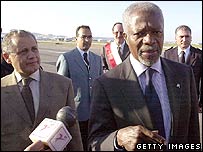Untitled Document
 |
Negotiators worked late into
the night on a deal |
The US has won its fight to stay in charge of the internet, despite
opposition from many nations.
In an eleventh-hour agreement ahead of a UN internet summit in Tunis, Tunisia,
negotiators agreed to leave the US in charge of the net's addressing system.
Instead an international forum will be set up to discuss net issues, although
it will not have any binding authority.
The deal clears the way for the summit to focus on how poorer nations can benefit
from the digital revolution.
About 10,000 delegates, including world leaders, technology experts and campaigners,
are expected at the three-day World Summit on the Information Society (WSIS)
in Tunis.
International forum
Disagreements over control of the internet had threatened to overshadow the
summit, with countries such as China and Iran pushing for an international body
under UN auspices to oversee the net.
The US had stood firm against this, arguing that it would stifle technological
advance and increase censorship of the internet by undemocratic regimes.
The Tunis deal leaves the day-to-day management of the net in the hands of
the California-based Internet Corporation for Assigned Names and Numbers (Icann),
which answers to the US government.
Icann will keep its current responsibilities for overseeing domain names and
addressing systems, such as country domain suffixes, and managing how net browsers
and e-mail programs direct traffic.
The 170 nations taking part in the negotiations agreed on the creation of an
Intergovernmental Forum to discuss all internet issues, such as spam, viruses
and cyber crime.
"We did not change anything on the role of the US government with regard
to the technical aspects that we were very concerned about," said the top
US negotiator David Gross after the agreement.
Mr Gross said the forum would not have oversight authority nor would it do
"anything that will create any problems for the private sector".
Its first meeting is likely to be held in Athens, Greece, early next year.
Casting a wider net
 |
"The hurdle here is more political
than financial. The cost of connectivity, computers and mobile telephones
can be brought down" Kofi Annan, UN Secretary General |
The agreement on internet governance means that delegates at the Tunis meeting
can focus on how far governments have gone in their pledges for an "inclusive
information society", set out two years ago at a first summit in Geneva.
Back then, nations pledged to make the net accessible to all by 2015. But worldwide
only 14% of the population is online, compared to 62% in the US.
The Geneva summit disappointed many countries after the rich nations failed
to back a Digital Solidarity Fund.
The fund, intended to help finance technology projects in developing countries,
was formally launched earlier this year.
The voluntary fund has so far only raised $6.4m (£3.68m) in cash and
pledges, so the UN will be hoping to encourage more contributions.
Opening the UN summit, Secretary General Kofi Annan said the task now was to
make the move from diagnosis to deeds.
"The hurdle here is more political than financial," he said. "The
cost of connectivity, computers and mobile telephones can be brought down.
"These bridges to a better life can be universally affordable and accessible.
We must summon the will to do it."
One effort which will receive much attention is the non-profit One Laptop Per
Child group, set up by Nicholas Negroponte, chairman and founder of the Massachusetts
Institute of Technology Media Labs.
It plans to produce up to 15 million sub-$100 laptops within a year. Professor
Negroponte will unveil the prototype at the summit.
There will be hundreds of other projects, events, roundtables, high-level talks
and exhibitions at the summit too.
There are other larger social justice issues to be tackled, such as how to
ensure freedom of expression and information for everyone on the net, an issue
which bloggers will be watching closely.
Ahead of the summit, there have been concerns about freedom of expression in
Tunisia, following alleged assaults or harassment of journalists and campaigners
on the sidelines of the event.
WSIS takes place in Tunis from 16 to 18 November.

